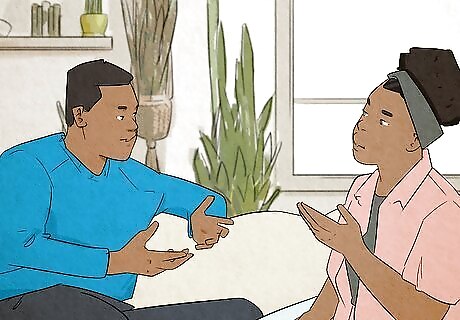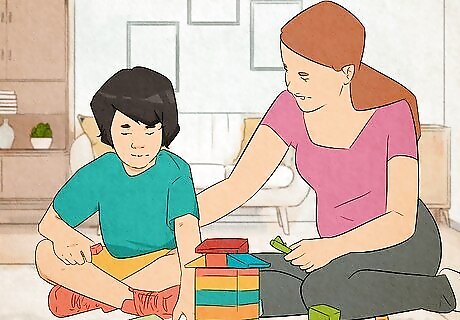
views
- Before getting serious with a man with a kid, ask yourself if you’re really ready to take on the responsibility—and be honest with yourself.
- Expect him to prioritize the kid, especially at first. Over time, you’ll likely become part of the family, but for now, you’ll probably come second.
- Slowly ease yourself into the kid’s life after you and the father have gotten serious, and realize it may take time for them to adjust to you.
Assess what you need from the relationship.

Know what you expect before things get serious. Be honest with yourself. Know from the start what you truly need and anticipate from this relationship. Ask yourself whether you intend to pursue and commit to a lifelong relationship with the father or whether you’re only interested in a casual relationship. It’s important that you don’t adopt the persona you think he (or his kid) will want you to have. It’s OK if you’re not prepared to take on the responsibility of dating a man with kids—but be honest with yourself about it from the get-go, or there’s bound to be heartbreak down the road.
Realize he might still be grieving his last partner.

It's completely normal for him to still be mourning his previous relationship. Whether the father is a widower, a divorcee, or a parent out of wedlock, he may be grieving his past relationship while you’re together. Also be aware that men are more likely than women to hide their feelings, so don’t assume everything’s fine just because he says it is. If you’re interested in pursuing a long-term relationship, invite him to openly discuss his loss. Use your conversations to evaluate how well he’s coping with it. If it’s only been a short time since his previous relationship ended, it may not be wise to get involved in a new relationship just yet because his pain might be too fresh.
Accept second place in the beginning.

Expect to feel like a third wheel sometimes. It's important to embrace early on that his child is his number-one priority and that you'll need to be flexible when scheduling your own quality time with him. Realize that alone time will likely be limited, depending on how young his child is and what the custody situation is. Appreciate the fact that his money will likely be earmarked first and foremost for his child’s needs. This may sound like a bummer, but think of it as an excellent way to judge the father’s character. If he’s showering you with time, money, and attention while neglecting his kid, consider that a red flag. Remember this is only temporary. Look forward to becoming an equal member of the family as you gradually integrate over time. Note that there’s a difference between him prioritizing his children, and him using his children as scapegoats for not prioritizing you: while a relationship with a single father is different from a relationship with a childless man, it’s still a relationship, and it requires attention too.
Know that you’re beginning more than one relationship.

Be prepared to have a relationship with his kid and maybe his ex. If you’re expecting your relationship with the father to become permanent, it's reasonable to expect to have one with the child and potentially the mother as well. Even if the mother has passed on or is largely absent from your own life, she will still maintain a large presence in both the father and child’s mind. Ask the father early on about the family’s history. Learn as much as you can about both the child and the mother before you meet them: their character, their interests, their strengths and weaknesses, etc. Use the father’s answers to better understand the man you’re dating. For instance, while he may have criticisms about his ex that are perfectly valid, be wary if he places 100% of the blame for everything that’s ever gone wrong entirely on her. Judge for yourself how well he’s able to assess a situation objectively and accept responsibility for his part in it.
Try to be flexible.

A relationship with a single parents comes with lots of variables. Know that you’ll need to be a lot more flexible than you would be in a relationship with a single man without children. Understand that the father’s relationship with the mother may change over time, for better or for worse. Appreciate the fact that the child’s thoughts and feelings may alter as well, both as they age and as your own status in their lives changes. Expect to face far more stress and challenges than you’ve grown accustomed to in childless relationships. Expect the unexpected—but think positively! While it’s important to be realistic about the situation that you’re entering, don’t let challenges and stress dissuade you from pursuing a future with the father if you think it’s worth it. Remember that challenges met and overcome can be rewarding experiences in their own right. Realize you might have to make some lifestyle adjustments if you begin dating a guy with kids. For instance, if you're used to staying out late or sleeping in, your sleep schedule may have to change to accommodate his kids.
Realize that you won’t be sharing “firsts.”

The father has already achieved some relationship milestones you haven't. Whether you’re hoping to marry the father and/or have children of your own, accept the fact that the father has already done one or both of these things. Ask yourself how much importance you really place on reaching these steps together as mutual “firsts” in your life journey. At the same time, consider the fact that you’ll have a partner who has prior concrete experience with things that, for now, are only hypothetical for you personally. He'll have more intimate knowledge about the situation as a whole and what to expect, as well as more self-knowledge about his own capabilities in that situation.
Watch out for red flags.
This is a new experience, so it's important to keep an eye out for red flags. At first glance, being a parent may sound impressive, independent, and mature, but single fathers are just as capable of having red flags as anyone else. If he ever uses his children as an excuse to neglect or mistreat you, or if he prioritizes you over his child, run. Here are some major red flags to watch out for: You may have to accept being the third wheel for a while, but if the father consistently uses his kid as an excuse for blowing you off, it's a bad sign. Generally, his being on good terms with his kid's mother is a green flag, but if he seem too close, he might not be completely over her yet. If he complains too much about the mother, on the other hand, that could be a sign he has more healing to do before dating someone else. If the father ever pressures you into taking on unexpected responsibility for the child, especially early on in the relationship, it's not a good sign. While some single parents might make the mistake of neglecting their partner for their child, if it seems like he prioritizes you over his kid, that's also a huge red flag.
Reevaluate your expectations.

After you've thought everything through, reassess your needs. Once you’ve considered the reality of dating a single father, reevaluate what you honestly need from a relationship. Based on that, ask yourself if you can really expect those needs to be fulfilled in these circumstances. Decide then whether to walk away or continue dating. If you’re only seeking a casual relationship, let the father know. If he’s fine with that, continue to date without involving yourself at all in the child’s life. If you want to keep things casual but he wants more, or if you’d like to pursue a deeper relationship as well but feel way too daunted by the circumstances, let him know that there’s a conflict of interest here. Tell him that the situation is simply too much for you. Don’t allow yourself to be backed into a situation that you can’t handle. If you’re willing to commit to a long-term relationship and become part of the child’s life, find out as much as you can about what you’re walking into. Ask other people in similar circumstances about their own experiences. Seek professional help about what to expect. Find out more about the child and their mother, both from the father and from any other mutual acquaintances you may have for a more rounded view. Every situation is different, so learn as much as you can about your own before taking the bigger plunge.
Ask the father what he needs out of a relationship.

Ask what he expects of you. Talk about his own needs. Know from the start what he expects from your relationship together as well as your future relationship with his child.
Communicate your expectations with the father.

Define your own limits before getting too serious. Resist the urge to please. Avoid taking on more responsibility than you’re comfortable with or obligated to accept. Clearly define yourself as a source of support for him, the parent, and not a parent yourself. Establishing boundaries early on will prevent you from falling into a role you aren't prepared to take on. Due to learned gender roles, widowers and male divorcees may often finding themselves lacking in certain parental skills possessed by the mother. To compensate, the father may hope for you to step in and fill the mother’s role, whether or not he’s even conscious of it. Make it clear to him that his duty is to learn these skills himself and not merely replace the mother with you.
Take the relationship slowly.

Getting serious too quickly can have major ramifications on the child. Whether you’re dating casually or already madly in love, avoid rushing into the relationship at any step. Appreciate the fact that your status as a couple will almost certainly be an upheaval in his child’s life. Avoid upsetting the child’s world by stepping into it too quickly. There's no designated amount of time you must date before meeting your partner's child, but wait until you're serious—at least 6 months, maybe longer. The age of the child will also influence the wait time: if the child is very young and not familiar with the concept of dating and relationships, consider waiting a bit longer. If they're a teenager or older, they likely have a firmer understanding of the situation and will be better equipped to handle it. Make sure you and the father are on the same page about the relationship before meeting his kid. If either one of you still feels more casual than committed, wait a little longer. Even if you both feel ready for you to meet his child, give yourself some extra time before actually doing it, just to be sure.
Communicate constantly throughout the relationship.

Emphasize honesty for the child’s sake. Accept the fact that your situation will produce a large amount of stress and potentially negative feelings. Express any doubts or misgivings that either you or the father may have. Know where each of you stand at any given point in time, especially before making the larger step of involving yourself in his child’s life.
Ask the father about his relationship with the mother.

Know where they stand with each other. Find out whether their split was amicable, bitter, or somewhere in between. If their current relationship is openly vicious, brace yourself for the extra drama and stress that this will undoubtedly add to your own relationships with the father and his child. If their current relationship is quite friendly, politely but firmly establish yourself as the father’s new partner. Appreciate the fact that the 2 have a prior intimacy that may inform their interactions, but don’t be afraid to speak up when you believe either one has crossed a line.
Respect the mother's role.

Remember that she’s the child’s parent. Understand that she will always occupy a space in the child’s life, and vice versa. Accept the fact that, to some degree, you will have to hold yourself accountable to her as a presence in her child’s life. Even if she’s a negligent or otherwise poor parent, remember that her status as mother will never change. Don’t feel obligated to respect the woman, but do respect the fact that she will always play some sort of role in both the father and child’s life. Also be aware that the child will likely feel more loyalty toward their mother than they will toward you. Regardless of your personal feelings toward her, be careful what you utter within earshot of their child. Don’t lose the child’s respect by disrespecting their mother in front of them. Even if you can’t stand each other, make a point of being civil. Earn respect and/or the moral high ground by being polite in order to better ensure a positive atmosphere for all concerned, especially the child. Even if she's no longer alive, her presence will still be there. If the father is a widower, accept the mother’s continued presence in both his life and the child’s.
Keep your first meeting with the child simple.

Take a baby-step approach to entering their life. For your first introduction, plan no more than an opportunity to say hi to the child and then introduce yourself as a friend of their dad’s. Choose a low-key setting to meet. Keep it casual as opposed to a formal setting where you would be clearly identified as the father’s “date.” Pick a time and place that are both clearly part of the father and child’s time together, rather than a date between yourselves with the child in tow. An amusement park or zoo are good options, since the kid can enjoy fun and distraction and the focus isn’t all on you. Plan to make a brief appearance and then exit by yourself, leaving them alone together, so that your presence comes across as incidental. Avoid leaving the child with the impression that you’re “taking Daddy away.”
Take your relationship with the child slowly.

Increase the time you spend together very gradually. Pop up here and there to say hi and establish that you’re a presence in Dad’s life, but limit your exposure in the beginning so that the majority of the kid’s time with Dad is spent one-on-one with him. This will give the child time to slowly process your presence in their life. Understand that even once they do accept your role in their life, their acceptance may not develop into an emotional bond. Avoid trying to force a bond between you. In the meantime, be present and consistent in their lives, offering yourself as an added resource for them should they ever choose to make use of it.
Have empathy toward the child.

Imagine your presence from the child’s perspective. As you spend more time with them, remain conscious of what impressions the child might take away from your encounters. Prioritize the father-child relationship. Be careful not to come across as competition for Dad’s attention.
Establish your role as the child's father’s partner.

Take things slow with the kid, but make your role as the dad's partner clear. Once you and the father have made the child aware of your relationship, make it clear to the child that you’re not here to be the new “Mom” or another “Dad.” Equate yourself with the role of aunt, uncle, teacher, or a similarly respected adult figure with a vested interest in their well-being.
Maintain your role when the child challenges you.

Some friction is inevitable, but deal with it calmly. No matter how well-adjusted or behaved the child is, realize you won't always get along; expect them to act out at times as all children do. Be prepared for a delicate balancing act. When confronting the child, expect to hear that you are not their mom or dad. Accept the truth of that statement. At the same time, assert yourself as an adult figure to whom they must show some respect. Demand support from the father. Remind him that while your role is to support him as a parent, his role is to be the parent. Don’t allow yourself to be backed into the position of being the disciplinarian by default. Establish a game plan with the father about how to handle conflict with his kid: when they misbehave, do you deal with it directly, or do you take the issue to him to handle? Make sure you're both on the same page.
Be patient with the child.

Realize your new role in the child’s life will test them continually. Expect them to take a while to accept your presence. Also expect their progress to be upset by each milestone that you and their father achieve; for instance, while they may have grown to accept your role as Dad’s new partner, they may be knocked back a couple steps once you and Dad announce that you’ll be moving in together or getting married.



















Comments
0 comment